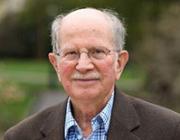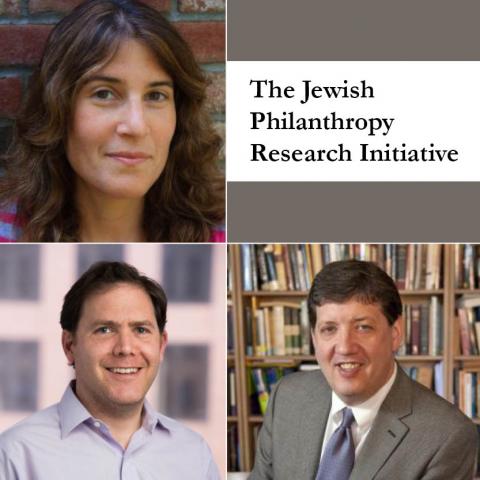Interview with Dr. Stanley N. Katz
August 12, 2020
At the helm of J-Phil is an advisory council comprised of scholars interested in the intersection of Jewish studies and the study of philanthropy. To introduce the council members, Leah Lerner and Adam Goudijl, undergraduate research interns for J-Phil in the summer of 2020, conducted brief interviews that will be posted here roughly once a month. The first is a conversation with Professor Stanley N. Katz, whose seminal contributions to the study of American philanthropy include his role as coeditor of HistPhil, a web publication devoted to the study of philanthropy and the non-profit sector.

Can you share a bit about your own research as it relates to Jewish philanthropy?
My focus has never been on the Jewish aspect of philanthropy, although I have long been interested in the role of Julius Rosenwald as a philanthropist. However, it has never been clear to me to what extent Rosenwald thought of himself as a Jew, much less as a Jewish philanthropist. Which brings up a major question for our project: are we interested in philanthropy as practiced by Jews, or are we interested in the specifically Jewish character and practice of philanthropy? The second question is more interesting, but much more difficult, especially given the enormous diversity of the American Jewish community, particularly as it has developed over time.
What motivated you to join the Jewish Philanthropy Research Initiative? Why do you think it is important to encourage more research on Jewish philanthropy?
I know several of the organizers of the project, but especially Ben Soskis (who did some of his dissertation work with me as a grad student) and Lila Corwin Berman. But it is also true that as a Jewish scholar, I would be fascinated to learn more about my own tradition. This is particularly true given that in recent years, some of the most prominent Jewish philanthropists and philanthropic organizations have taken positions (especially with respect to Israel) with which I disagree. I should try to understand them better.
What question or questions in the study of Jewish philanthropy do you find particularly interesting? What merits more research?
How does the traditional Jewish concept of tzedakah relate to the modern (especially American) idea of philanthropy? I suppose this is partly a question of the impact of diasporic Judaism on the conception and practice of what I would call post-charitable charity. In the United States we will have to grapple with the problem of distinguishing attitudes toward Israel from attitudes toward Judaism. A second problem we need to confront is whom we define as Jewish. Many American Jews have intermarried (as I have) or are the products of religious intermarriage. To take a concept from American racial ideas, does one drop of Jewish blood make a person a Jew? If not, what does? Thirdly, is any philanthropy engaged in by a Jewish donor Jewish philanthropy, or are we only interested in gifts that are somehow directly connected to Jews and the Jewish experience?
In your “Looking Back at 50 Years of U.S. Philanthropy” report with Benjamin Soskis, you note the lack of diversity in major foundation boards. Is this the case for Jewish organizations as well? Are movements, genders, and ethnicities fairly represented on these boards?
I do not know the answer to this question, since I have not yet done any research on it. But certainly in my personal experience to date, Jewish organizations are not very diverse. I think they are doing better in terms of gender diversity, but probably not so well in terms of religious diversity. But this last concept is not so clear, since it begs the question I raised earlier of “who is a Jew?” But, more important, in Jewish organizations diversity also needs to contend with the considerable range of attitudes across the various “brands” of American Judaism — Orthodox to Reform, and more — as well as the great range of American Jewish attitudes toward Israel. This is probably the most important question about diversity across American Jewish organizations.
For links to some of Katz’ many publication, see here.
Announcing The Jewish Philanthropy Research Initiative
October 22, 2019
In a newly published study that draws on the first comprehensive data set of US-based Jewish philanthropic organizations, Hanna Shaul Bar Nissim and Mathew Brookner show that such organizations gave more than $46 billion in grants in the period between 2000–2015. Beyond what it reveals about the amount of money American Jews invest in philanthropy, the data is full of yet-to-be-tapped insights into the nature of American Jewish life today, including the importance of foundations in setting the Jewish communal agenda.*
In comparison with the scale and impact of Jewish philanthropy, however, the study of Jewish philanthropy is woefully underdeveloped. To be certain, an increasing number of individual scholars are researching related topics, and philanthropic professionals have developed expertise on the current state of Jewish philanthropy. But there is no subfield of Jewish philanthropic research, neither within Jewish studies nor within philanthropic studies—not a single professorship in Jewish philanthropic studies in the United States, and no academic journal devoted to the subject. Indeed, many Jewish philanthropic organizations, even large ones, have no plans to keep their papers, let alone donate them to archives, even as they speak often and passionately about their legacies.
For the three of us—Lila Corwin Berman in her role as director of the Feinstein Center for American Jewish history at Temple University, Benjamin Soskis, a researcher and historian of philanthropy at the Urban Institute, and Steve Weitzman, in his role as director of the Katz Center for Advanced Judaic Studies at the University of Pennsylvania—the current state of affairs represents a profound missed opportunity. Deeper study of Jewish philanthropy is important not just to Jewish philanthropic organizations themselves but to the broader understanding of Jewish life in the United States and around the globe. It is both relevant to some of the most pressing questions in our world today and, also, germane to how we study the past. Furthermore, the study of Jewish philanthropy has the potential to tell us much about other religious and ethnic groups, who likewise have been shaped by questions involving resource distribution, authority, and wealth.
For this reason, we have launched the Jewish Philanthropy Research Initiative, a collaboration between Temple University’s Feinstein Center for American Jewish History and the University of Pennsylvania’s Katz Center for Advanced Judaic Studies. In this first phase, our goal is to bring together scholars from different fields to share work and learn from each other. We aim to draw connections among diverse approaches and to create a sense of community and network among scholars isolated from each other in various disciplines and institutional contexts. In other words, we seek to do for the sub-field of Jewish philanthropy what HistPhil has sought to do for the field of the history of philanthropy.
In mid-September, we convened a small circle of scholars from different subfields, along with a few philanthropic professionals, to probe different dimensions of the topic and to brainstorm the possibilities for this initiative. Meeting over two days at the Katz Center in Philadelphia, we broached a number of different and sometimes difficult topics, including how to surmount the challenges of field building, how to balance a US focus against a global perspective, and how to bridge the gap between academic research and what philanthropy professionals want or need to know. The discussion only scratched the surface, but it was enough to reconfirm the importance of a sustained initiative. Philanthropy is a major part of Jewish life, and a highly consequential one not just for Jews but for people more broadly. Yet, among Jewish studies scholars, we lack the tools to understand the larger historical, cultural, political, and economic context in which it developed and which continue to shape it.
In the coming year, we plan to extend our efforts to define a field of inquiry devoted to Jewish philanthropy. These efforts can only succeed if we generate a broad and sustained conversation among scholars who are pursuing topics connected to the study of Jewish philanthropy. Even if many of these scholars have never described themselves as scholars of Jewish philanthropy (and likely they have not!), we hope that as they learn about this initiative, they will feel a spark of recognition and decide to contribute their perspective to it. As we build, we imagine supporting scholars in their research, working with archivists and libraries to collect sources relevant to Jewish philanthropy, organizing seminars and conferences, creating resources to help teach the topic at the undergraduate and graduate level, and, ultimately, contributing to the knowledge about Jewish communities, texts, beliefs, and histories in multiple contexts.
In undertaking such an initiative, we acknowledge there will be challenges. One is how to contend with the anti-Semitic caricature of Jews as a global elite that uses its wealth to assert political and social control. That stereotype has reasserted itself in recent years, and it makes any exploration of how Jews deploy wealth a more fraught and dicey topic than it would be for many other religious and ethnic groups. We aim to be sensitive to the risks, but ultimately, we do not believe they should deter data collection, inquiry, or a critical approach to the topic.
Another challenge is that the field of Jewish studies is itself the fruit of philanthropic support, owing its vitality to the very practice we are seeking to understand. This situation means that we are not completely disinterested observers, and it potentially introduces bias into the research. For this reason, we have conceived this initiative on the model of distributed knowledge production, not confining it to a single research center or relying too much on a single scholar but aiming to include scholars from various perspectives and institutions who can both support each other and serve as checks on one another. Given the way the field of Jewish studies works, we will probably have to seek philanthropic support to sustain this effort, but our intention is to do all we can to preserve the independence and accountability necessary to advance original, reliable, truth-telling research.
We look forward to sharing more about the initiative as it develops, and will relish opportunities to engage other areas of philanthropic study.
* Hanna Shaul Bar Nissim and Matthew Brookner, “Ethno-Religious Philanthropy: Lessons from a Study of United States Jewish Philanthropy,” Contemporary Jewry 39 (2019): 31-51.



